Top Quiet Portable Generator for Camping: Power Your Adventures!
Choosing the best portable generator for camping hinges on compactness, quietness, and efficiency. This guide helps you navigate these essentials, from crunching power capacity numbers to understanding fuel usage to ensuring your camping stays illuminated and your gadgets are charged without taking away from the serenity of the great outdoors.
- Key Takeaways
- Choosing the Ideal Portable Generator for Camping
- Powering Your Campsite with the Right Inverter Generator
- Essential Features of Camping Generators
- Fuel Choices for Portable Generators: Gas, Propane, or Battery?
- Accessorizing Your Generator for Enhanced Camping Experience
- Maintenance Tips to Keep Your Generator Running Smoothly
- Real-Life Applications: How Campers Use Portable Generators
- Buying Options: Top Picks for Portable Camping Generators
- Summary
- Frequently Asked Questions
Key Takeaways
Compact and quiet portable generators enhance the camping experience by providing efficient power without noise pollution, fitting for space constraints, and focusing on fuel efficiency for extended use.
Inverter generators are preferred for their low-noise output, efficiency, and clean energy production that is safer for sensitive electronic devices, making them suitable for powering gadgets on camping trips.
Practical features like built-in USB ports, adequate running watts for common camping appliances, and portability enhancements such as wheels and handles contribute to the functionality and user-friendliness of a camping generator.

Choosing the Ideal Portable Generator for Camping
The perfect portable generator for camping is like a Swiss army knife—compact, quiet, and efficient. It’s not just about power; size matters too. A petite generator can easily fit in your camper or the backseat of your car, making it easy to carry to your campsite.
Quiet operation ensures that you can enjoy the tranquility of nature without disturbing the peace. And with a quiet generator, greater fuel efficiency allows your generator to run longer, giving you more time to enjoy your camping adventure without worrying about refueling.
Size Matters: Compact and Lightweight Options
Compact and lightweight generators are the unsung heroes of camping trips. These little powerhouses can provide essential comforts like charging your phone, running a mini fan, or even brewing that perfect cup of coffee. The Pulsar PG1202SA, Imuto’s 200W-14002 portable power station, and the Jackery Explorer 240 are examples of compact generators that pack sufficient power for your camping needs. But remember, with compactness often comes limited power capacity, so you might need to manage your power usage strategically during your camping trips.
Silence is Golden: The Importance of Low Noise Levels
Nobody wants their peaceful camping experience disturbed by the loud humming of a generator. That’s where quiet generators come in, operating within the 50–60 decibel range, similar to a normal conversation. This ensures that you can enjoy your camping experience without disturbing your neighbors, wildlife, or drawing unnecessary attention.
The Predator 3500-watt portable gas generator, for instance, works silently in the background, offering a balance of power and reduced noise levels.
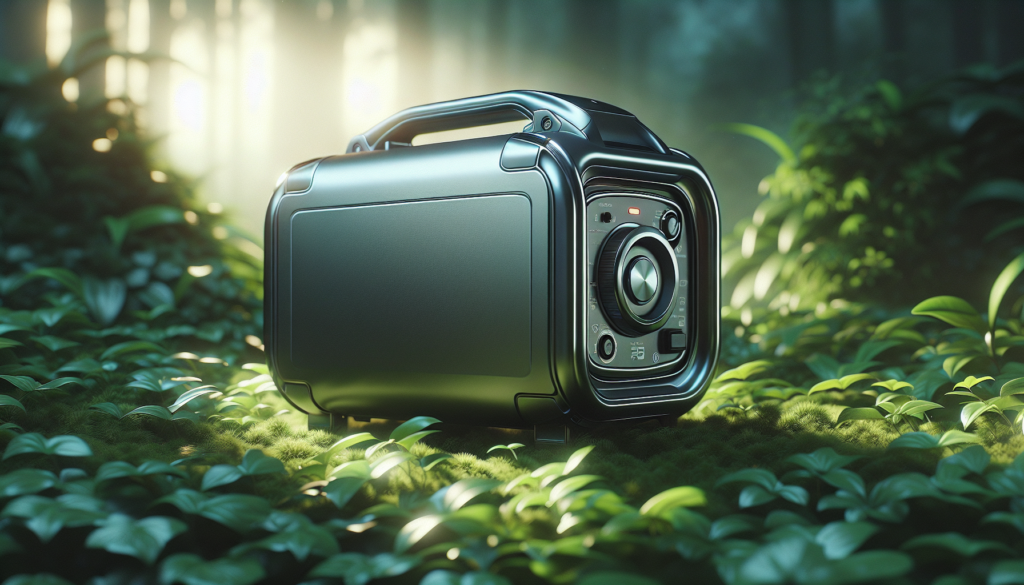
Fuel Efficiency: Longer Run Times, Less Refueling
When it comes to camping generators, fuel efficiency is a game-changer. It stretches your fuel budget and reduces the frequency of refueling, especially during the night. Most portable camping generators are designed to run for at least 8 hours at 50% of their rated output, perfectly fitting the need for extended use during camping trips.
So, when planning your fuel needs, consider a conservative estimate of 4 hours per tank, with additional fuel as a buffer for unexpected circumstances.
Powering Your Campsite with the Right Inverter Generator
Choosing the right generator can make all the difference in your camping experience. Inverter generators have emerged as a favorite among campers. These generators are usually in the 2,200-watt power range, providing sufficient electricity for most camping appliances and tools. But what sets them apart is the cleaner power they produce, making them safe for charging and operating sensitive electronic devices.
Plus, they offer quieter operation, which is less disruptive to both campers and wildlife compared to traditional generators.

Clean Energy: Why Inverter Generators Are Superior
Inverter generators are like the superheroes of camping generators. They produce cleaner energy, ensuring the safe operation of sensitive electronic devices like smartphones and laptops. The inverter technology within an inverter generator maintains a consistent voltage level, protecting your electronics from potential damage due to voltage fluctuations.
So, if you’re a camper who can’t live without their gadgets, an inverter generator might just be your best bet.
The Quiet Champion: Inverter Generators’ Reduced Noise
Inverter generators are the quiet champions of the generator world. They operate at significantly lower noise levels than traditional generators, with noise levels typically ranging between 50 and 60 decibels. This is because they adjust their engine speed based on power demand, unlike traditional generators that operate at a constant speed.
Take the Yamaha EF2000iSv2 and Generac iQ3500, for instance. These generators operate quietly, producing 51–61 dBA and as low as 45 dB noise levels, respectively, making them less disruptive to your camping experience.

Essential Features of Camping Generators
A camping generator is more than just a power source; it’s your ticket to a comfortable and enjoyable camping experience.
Essential features, such as:
USB ports allow you to charge your devices directly
Adequate running wattage ensures your generator can power common camping appliances and devices
Portability enhancements like wheels and handles make your generator easy to move around the campsite
Must-Have USB Ports
In today’s digital world, USB ports on generators are a must-have. They allow for convenient charging of devices like smartphones, tablets, and cameras without the need for an adapter. Just remember, not all generators come equipped with USB ports.
The Honda EU2200i, for example, lacks this feature, which could be a disadvantage if you need to charge USB devices directly.
Keeping the Lights On: Adequate Running Watts
Running watts is the amount of power a generator can sustain continuously. Adequate running wattage ensures your generator can power common camping appliances and devices. For instance, to run common camping appliances like coffee makers and mini-fridges, especially for simultaneous use, a generator with at least 1500 watts of output power is recommended.
While small camping generators may not provide sufficient power to run larger appliances like air conditioners or heaters, they are perfect for powering smaller appliances and lights.
Portability Perks: Wheels and Handles
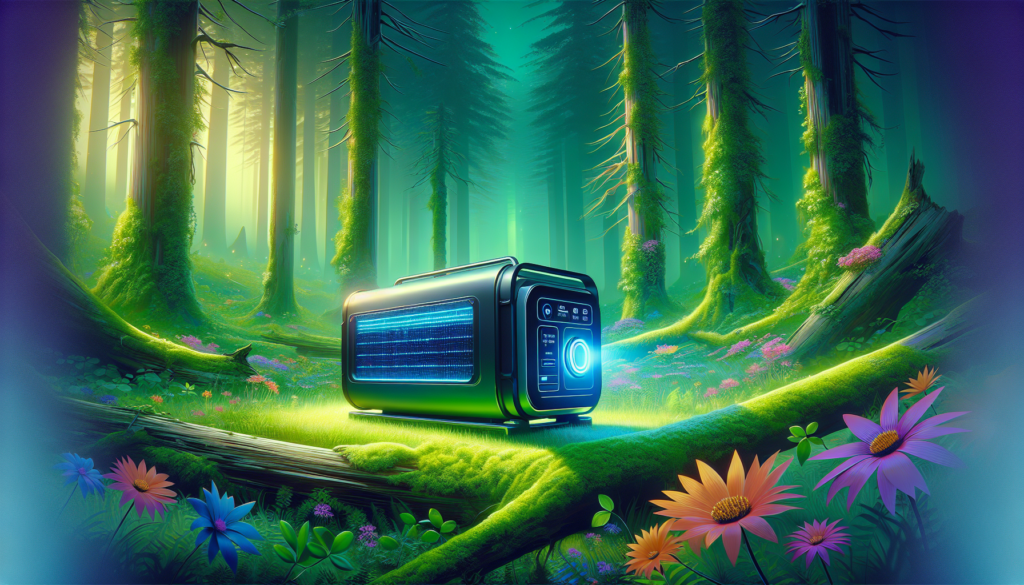
One of the biggest advantages of portable generators is, well, their portability. Generators equipped with wheels and handles are easy to move around, making them perfect for camping, where you might need to relocate your generator frequently. In fact, some generator wheel kits feature ‘never flat’ tires, ensuring you won’t be left stranded due to a flat tire.
The Honda EU3000iS and the lighter EU3000i Handi model, for instance, offer optional wheel kits and handles for enhanced maneuverability.
Fuel Choices for Portable Generators: Gas, Propane, or Battery?
Choosing the right fuel for your generator can feel like a tricky task. Should you go for gas, propane, or a battery-powered generator? Each has its own advantages. Gas generators are known for their affordability and portability, making them a popular choice for short-term applications.
Propane generators burn cleaner and have a longer shelf life than gasoline generators. And while battery-powered generators may require a higher initial investment, they offer an eco-friendly alternative to traditional gas generators. Also, check out our Complete Guide to Propane Camping Stoves for more propane ideas.
Gasoline Generators: Availability and Power
Gas-powered generators, like traditional generator models such as gasoline generators, are the old faithful of camping generators—always there when you need them. They offer affordability and portability for short-term power needs.
The WEN 4750/3800 Watt Dual Fuel Gas/Propane Generator, for instance, is a top low-cost pick that provides both 120 and 240-volt outputs and can produce up to 4,750 watts of power.

Propane Generators: Clean Burning and Long Shelf Life
If you’re looking for a cleaner-burning option, propane generators are your best bet. They offer several advantages:
They produce lower emissions compared to gasoline generators
They have a significantly longer shelf life
Refilling propane tanks is convenient as it can be done by a service company, removing the need for you to transport heavy tanks
Just make sure to select the right tank size to ensure an adequate fuel supply.
Battery-Powered Generators: The Eco-Friendly Choice
For the environmentally conscious camper, battery-powered generators are the way to go. These generators are favored for their:
Quiet operation
Lack of emissions
Ability to be sustainably replenished for free using solar panels
Portability
While they might require a higher initial investment, battery-powered generators offer a sustainable and portable power solution for camping.
Take the Bluetti AC180 Portable Power Station, for example. It’s a convenient and eco-friendly choice for campers needing to power small appliances.
Accessorizing Your Generator for Enhanced Camping Experience
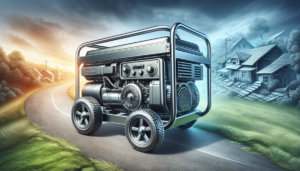
Accessories can add a whole new level of functionality to your camping generator.
Here are some accessories that you may find useful:
Wheel kits: add much-needed mobility to your generator
Protective covers: shield your generator from the elements
Suitable extension cords: extend your reach, allowing you to power your campsite with ease
These accessories not only enhance your camping experience but also improve your generator’s usability and safety.
Protective Covers for Harsh Weather
A protective cover is like a shield for your generator. Made from heavy-duty materials like 600D polyester, these covers protect your generator from rain, dust, and UV exposure. They often include features like elastic drawstrings for a secure fit and reflective strips for increased visibility.
Before covering your generator for storage, just make sure it’s situated in a clean, cool, and dry environment, free from dust and pests.
Power Strips and Extension Cords: Expand Your Reach
Power strips and extension cords are like the arms of your generator, extending its reach and allowing you to power multiple devices at once. Choosing the right outdoor extension cord is crucial, with factors like durability, power capacity, and length to consider.
So, whether you want to light up your entire campsite or just need to power your mini-fridge, a good extension cord can make it possible.
Maintenance Tips to Keep Your Generator Running Smoothly

Like any piece of equipment, your generator requires regular maintenance to run smoothly. This includes everything from regular oil changes to cleaning the air filters and even doing a monthly start-up. Proper maintenance not only ensures your generator’s longevity but also helps it function correctly.
Regular Check-Ups: The Key to Longevity
Regular check-ups and cleaning can significantly extend the lifespan of your generator. This includes weekly checks and cleaning of air filters, as well as monthly startup to ensure all components are lubricated and in good working order. By keeping a keen ear during startup, you can also catch any potential issues early, securing your generator’s longevity.
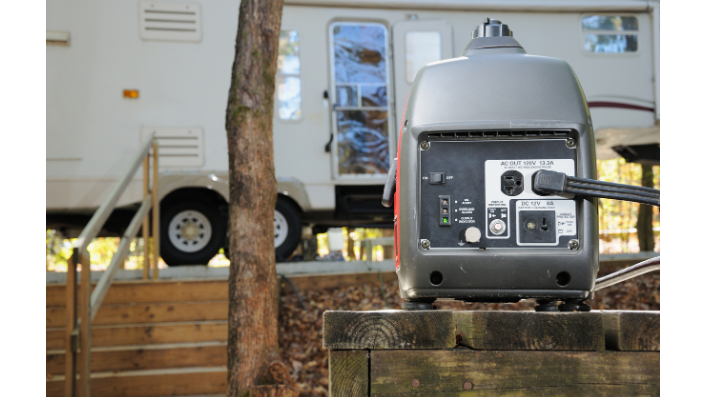
Storage Solutions: Preparing Your Generator for Downtime
Proper storage of your generator during downtime is crucial for its longevity.
Here are some steps to follow:
Add a fuel stabilizer to prevent gas breakdown.
Run the generator until the fuel is emptied.
Before storing your generator, check for any damaged wires and hoses.
Ensure the oil level is appropriate.
Clean the generator thoroughly.
By following these steps, you can ensure that your generator is properly stored and ready for future use.
Storing the generator in a cool, dry place can also help minimize the risk of rust and prolong its lifespan.
Real-Life Applications: How Campers Use Portable Generators
Portable generators are a camper’s best friend, providing power for a wide range of activities. Whether it’s for powering lights, charging devices, or even brewing coffee, a portable generator can make your camping experience more comfortable and enjoyable.
And with the quiet operation of inverter generators, you can enjoy the tranquility of nature without any disruptions.
Brewing Coffee in the Great Outdoors
There’s nothing quite like brewing a fresh cup of coffee in the great outdoors. And with a portable generator, it’s easier than ever. You can enjoy the comfort of a hot cup of coffee while immersing yourself in nature.
Not to mention, brewing coffee outdoors can save on electricity bills and reduce your Starbucks bill. So, the next time you’re out camping, don’t forget to pack your camping coffee maker along with your generator.
Illuminating the Night: Generators and Campsite Lighting

When it comes to camping, a well-lit campsite not only adds to the ambiance but also adds for safety after dark. Portable generators can power a variety of lighting solutions, from fairy lights draped around your tent to a bright lantern for midnight snacks.
So, when the sun goes down, you can rely on your trusty generator to provide power and keep the lights on in your entire house.
Buying Options: Top Picks for Portable Camping Generators
Choosing the right generator can feel like a daunting task, but with a little guidance, you can find the perfect one for your camping needs. The top picks for portable camping generators combine reliability, quiet operation, and power capacity. Whether you’re a weekend camper or a seasoned adventurer, there’s a generator out there to suit every camping style.
Honda Generators: A Blend of Reliability and Quiet Operation
When it comes to reliability and quiet operation, Honda generators stand out from the crowd. Models like the Honda EU2200i Companion, EU3000IS, and EU7000IS are renowned for their reliable performance and quiet operation. These models offer power outputs ranging from 2,200 to 7,000 watts, making them a great choice for campers who value peace and quiet.
So, whether you’re planning a weekend camping trip or a cross-country RV adventure, a Honda RV generator could be your perfect camping companion.
Alternative Brands Providing Value and Performance
While Honda generators are great, there are also other brands that provide value and performance. Some alternatives to consider are:
Yamaha’s EF2000iSv2 generator, which exceeds Honda’s emission compliance and indicates the use of high-quality components
Champion generators, which offer a 3-year warranty and show a solid commitment to quality
Anker 757 PowerHouse, which offers modern connectivity
WEN’s 9500 Watt Remote Electric Start Generator, which offers versatile use and caters to current trends in camping generators
These generators are worth considering as alternatives to Honda generators.
Summary
As we’ve seen, the perfect generator for your camping trip depends on several factors, from size and noise level to fuel efficiency and the type of fuel used. Whether you’re looking for a compact, quiet, and fuel-efficient generator or one with essential features such as USB ports, adequate running watts, and portability enhancements, there’s a generator out there to meet your needs.
Remember, regular maintenance and proper storage can ensure the longevity of your generator, making it your reliable companion for many camping adventures to come.
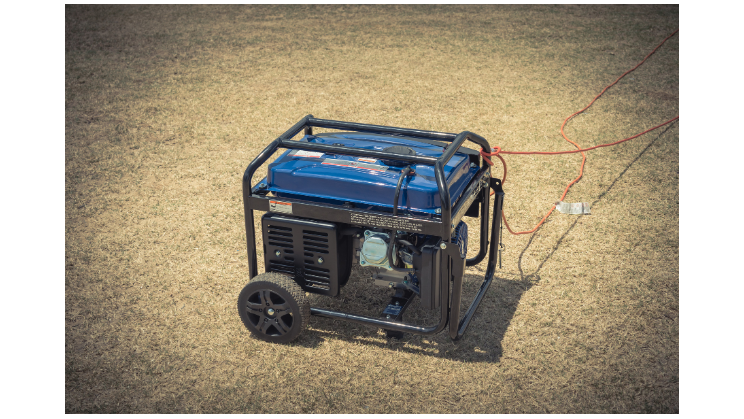
So, the next time you plan a camping trip, pack your portable generator and power your adventure!
Frequently Asked Questions
What size portable generator do I need for camping?
For camping, you’ll generally need a portable generator with a power output of 500–1000 watts to charge devices, power small speakers and lighting, and run essential kitchen tools. Aim for this range to meet your basic power needs while camping.
How many hours a day can you run a portable generator?
You can run a gasoline-powered portable generator continuously for about 6 to 16 hours at a time, while a well-managed propane portable generator can run for up to 150 to 200 hours at a time. Unlike standby generators, portable generators are designed for shorter increments of time, typically about 6–18 hours, and are not recommended for long-term use during power outages.
What size portable generator is needed to power a house?
To power a house, a portable generator between 5,000 and 8,000 watts is needed, which can support essential appliances like the air conditioner, sump pump, refrigerator, and more.
What size generator do I need for a 30-amp RV?
For a 30-amp RV, you will need a 3,500–3,600-watt generator to power most appliances and equipment. This size generator is suitable for running a small air conditioning unit, microwave oven, refrigerator, and lights simultaneously without overloading the system.
Why is size important when choosing a camping generator?
Size is important when choosing a camping generator because a compact and lightweight option is easier to carry and transport, making it ideal for camping trips. And transporting the generator can be a factor to think about.
Thanks so much for reading, and as always…
Stay Rugged!
